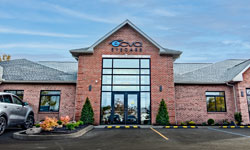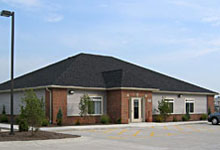Half of Americans aged 80 or older have cataracts or had surgery to remove them. Cataract surgery is one of the most common medical procedures in the United States. Cataract surgery is the only corrective treatment for this condition, effective in 97% of cases for restoring the vision of a person suffering from cloudy vision.
Cataract surgeons in Buffalo have seen firsthand how cataract surgery can improve the quality of life for their patients. This blog will help you understand the impact of cataracts on your life and how the surgery to remove them can be life-altering and positive.
What are Cataracts?
Cataracts are a common eye condition that typically occurs with age. They involve the clouding of the natural lens inside the eye, which leads to a progressive loss of vision. The lens of the eye is normally clear and helps focus light onto the retina at the back of the eye, allowing us to see clearly. However, when cataracts develop, the lens becomes cloudy, affecting the passage of light and causing vision problems.
How Can Cataract Surgery Improve Vision and Enhance Your Quality of Life?
A large and growing body of research shows cataract surgery can enhance your quality of life. Cataract surgery is an effective and commonly performed procedure that can significantly improve vision and enhance the quality of life for individuals with cataracts. Eye doctors for cataracts in Buffalo routinely perform this procedure to restore vision in their patients. Here are several ways in which cataract surgery can have a positive impact.
Cataract Surgery Improves Vision
Cataract surgery involves the removal of the cloudy lens in the eye and replacing it with a clear artificial lens called an intraocular lens (IOL). This replacement lens allows light to pass through unimpeded, restoring clear vision and improving overall visual acuity.
Cataracts can cause blurry or hazy vision, making it difficult to perform daily tasks such as reading, driving, or recognizing faces. Cataract surgery in Buffalo and worldwide can dramatically improve visual clarity, allowing individuals to see objects and details more sharply and clearly.
Cataracts can cause colors to appear faded or dull. After cataract surgery, many people experience a significant improvement in color perception. Colors may appear more vibrant and true to life, enhancing the visual experience for cataract patients.
Cataracts can make the eyes more sensitive to bright lights, causing discomfort and glare. By removing the cloudy lens and replacing it with a clear IOL, cataract surgery in Buffalo can alleviate these symptoms and improve tolerance to bright lights, allowing for better vision in various lighting conditions.
Cataracts often contribute to difficulties with night vision, such as halos, glare, or decreased visibility in low-light situations. Cataract surgery in Buffalo can improve night vision by eliminating the cloudy lens and replacing it with a clear IOL, enhancing the ability to see in dimly lit environments.
Cataract Removal Increases Independence
Cataracts can significantly impact daily activities and quality of life. Restoring clear vision through cataract surgery can help individuals regain independence and perform tasks with greater ease, such as reading, driving, participating in hobbies, and engaging in social activities. Improved vision can also lead to enhanced overall well-being and mental health.
Cataract Surgery Enhances Safety
Cataract surgery improves patient safety by addressing the vision impairment caused by cataracts, which can significantly impact an individual’s overall well-being and safety in various aspects of life.
Cataract surgery restores clear vision and improves visual acuity by removing the cloudy lens and replacing it with a clear intraocular lens (IOL). The procedure enables individuals to see objects, people, and potential dangers more clearly, enhancing their safety in navigating their environment. For example, cataracts can severely impair vision, leading to difficulties performing daily activities such as reading, driving, or recognizing hazards.
Cataracts can affect depth perception, making it challenging to judge distances accurately. This can pose risks while driving, walking on uneven surfaces, or engaging in activities that require depth perception. Cataract surgery improves depth perception by restoring clear vision, allowing individuals to assess distances better and navigate their surroundings safely.
Also, cataracts can cause sensitivity to bright lights, glare, and decreased contrast sensitivity. These visual disturbances can make it difficult to see clearly in bright sunlight, at night, or in environments with varying light levels. By removing the cloudy lens, cataract surgery reduces glare and improves contrast sensitivity, making it easier to see objects, recognize details, and navigate safely in various lighting conditions.
Cataracts often contribute to difficulties with night vision, such as halos, glare, or decreased visibility in low-light situations. These vision impairments can be particularly hazardous while driving or moving around in dimly lit areas. Cataract surgery improves night vision by removing the cloudy lens and replacing it with a clear IOL, thereby enhancing the ability to see in low-light conditions and improving safety during nighttime activities.
Cataracts can increase the risk of falls and accidents due to impaired vision. By restoring clear vision, cataract surgery reduces the likelihood of tripping over objects, misjudging distances, or missing potential hazards. Cataract surgery improves overall safety, particularly for older adults more susceptible to fall-related injuries.
Increase Your Life Expectancy with Cataract Surgery
Cataract surgery itself is not directly linked to an increase in life expectancy. Cataracts are primarily a vision problem, and while they can affect an individual’s quality of life, they typically do not directly impact overall life expectancy.
However, cataract surgery can significantly improve an individual’s vision and overall well-being. By removing the cloudy lens and replacing it with a clear intraocular lens (IOL), cataract surgery restores clear vision, allowing individuals to engage in daily activities, such as reading, driving, or participating in social interactions, with greater ease and safety.
Improved vision and enhanced quality of life resulting from cataract surgery may indirectly contribute to certain aspects associated with a longer life expectancy. For example, better vision can help individuals maintain their independence, engage in physical activities, and reduce the risk of accidents or falls, which can positively effect overall health and longevity.
Cataract surgery may also allow for better management of other age-related eye conditions, such as macular degeneration or glaucoma, which can further contribute to maintaining vision and overall eye health.
How Do You Know If You Need Cataract Surgery?
Symptoms of cataracts include:
- Blurry vision
- Faded colors
- Double vision
A comprehensive eye examination and consultation with an ophthalmologist or an eye care professional can determine if you need cataract surgery in Buffalo. Your doctor will assess your overall eye health, evaluate the severity of your cataracts, and consider various factors to determine if cataract surgery is necessary.
Consult the Eye Doctors at ECVA for Cataract Surgery in Buffalo, NY
As the leading cataract surgeons in Buffalo, NY, Eye Care & Vision Associates team is standing by to provide you and your loved ones the care you need for a lifetime. Find out why we are one of Buffalo’s most well-respected eye doctors for cataracts. Don’t waste another minute worrying about the health of your eyes. Contact ECVA, a respected and trusted cataract surgeon treating patients in Buffalo and the surrounding area.







